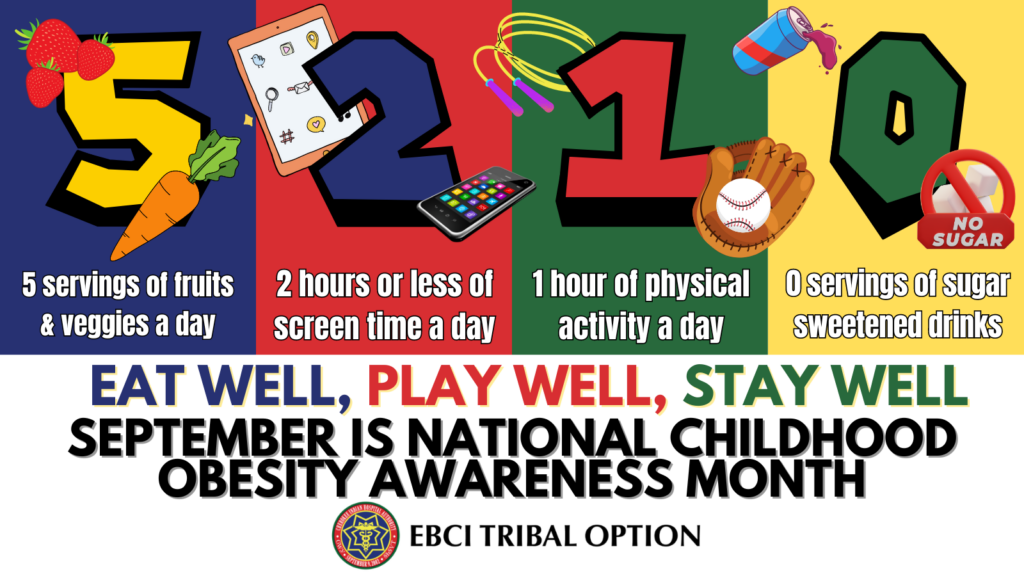September marks Childhood Obesity Awareness Month, an important time to focus on promoting a healthy weight among our children. As members of the Eastern Band of the Cherokee Indians, it’s essential to ensure that every child in our community has the opportunity to achieve optimal health. Remember, healthy bodies come in all shapes and sizes, and the key is to focus on fostering healthy behaviors that can be sustained throughout life.
The American Academy of Pediatrics (AAP) has developed the 5-2-1-0 recommendations, offering simple yet effective guidelines to help our children develop lifelong healthy habits.
5: Enjoy 5 or More Fruits and Vegetables Each Day
Fruits and vegetables are packed with the nutrients children need for healthy growth and development. Here are some tips to help your children eat more fruits and vegetables:
Fresh, frozen, and canned all count! Just be sure canned fruits are packed in their own juices (not heavy syrups), and rinse canned vegetables to reduce sodium.
Include fruits and vegetables at every meal, in lunch boxes, and as snacks.
Avoid using food as a reward; instead, offer praise, hugs, or high-fives!
Eat meals together as a family as often as possible.
2: Limit Non-Educational Screen Time to 2 Hours or Less Per Day
The AAP advises that children under 2 years old should avoid screen time altogether, except for video chatting with family. Excessive screen time in children not only increases the risk of obesity but can also lead to headaches, sleep issues, tantrums, and delayed language and emotional development. Here are some tips to help reduce screen time:
Avoid placing a TV in your child’s room.
Set screen-free hours and put devices away during those times.
Replace screen time with healthy activities, like physical exercise, reading, or sleep!
Turn off devices during mealtimes.
Bonus Tip: Ensure your child gets adequate sleep. Most preteens need 10-12 hours of sleep per night, while most teens need 8-10 hours.
1: Engage in One Hour of Physical Activity Each Day
Physical activity is crucial for your child’s physical and mental health. Children and teens need 60 minutes of moderate to vigorous physical activity daily. Preschool-aged children should be active throughout the day, with adults encouraging play. Here’s how to help your children stay active:
Help your child find and participate in physical activities they enjoy.
Be active together as a family—hike, walk, swim, or bike ride together.
Break up physical activity into 10-minute sessions throughout the day.
When possible, encourage your children to walk or bike to school—join them if you can!
0: Zero Sugar-Sweetened Beverages Per Day
Sugary drinks are the main source of added sugar in a child’s diet, providing little nutritional benefit and increasing the risk of type 2 diabetes, heart disease, and cavities. Here’s how to reduce sugar-sweetened beverages in your child’s diet:
Serve water or low-fat milk instead of sugary drinks.
Pack a water bottle for your children.
Make water more exciting by adding slices of lemon, berries, cucumber, or watermelon!
Choose whole fruits over fruit juice.
Raising healthy kids is a family effort, and it’s important to get the whole family involved. The best thing you can do to help your child achieve the healthy body that is right for them is to create and practice healthy habits together. Remember, Eat Well, Play Well. And Stay Well!
